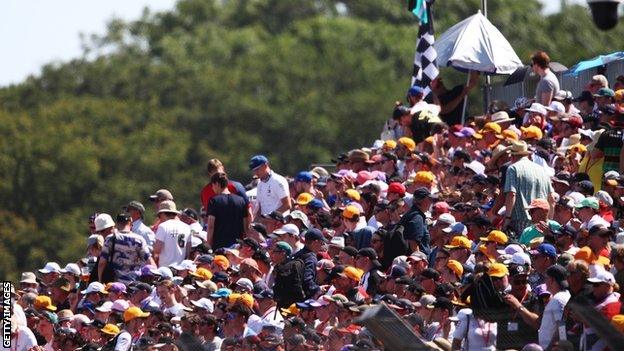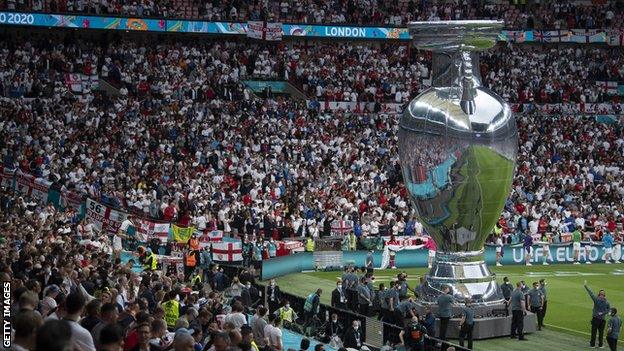FSA chief says making proof of vaccination mandatory at matches could cause 'chaos'
- Published

A capacity crowd of 140,000 attended the British Grand Prix at Silverstone last week
Making proof of full vaccination mandatory at Premier League matches could cause "chaos" at some clubs, the Football Supporters' Association has warned.
Fans attending sports venues with capacities of about 20,000 or more may be required to show proof of full vaccination from the end of September.
"I think if they're going to do this with big football crowds they need to have the resources to do the checks," FSA chairman Malcolm Clarke told Times Radio.
"I'm not convinced that all football clubs will be able to manage that in a way that doesn't cause some chaos."
BBC Sport understands the Premier League and its clubs have already been discussing what approach they will take to check fans on entry to stadiums next season, and how any plans might need to be adapted for each ground.
They are aiming to use the first few games of the season - before any potential rule changes would be brought in - to trial certification.
Prime Minister Boris Johnson announced on Monday there was a plan to mandate certification at nightclubs and "other venues where large crowds gather".
On Thursday, vaccines minister Nadhim Zahawi told the House of Commons that "as a condition of entry" to spectator sport events "people will need to show that they are fully vaccinated and proof of a negative test will not be sufficient".
Clarke told BBC Sport that fans with season tickets who are unable or unwilling to attend matches because of vaccine passports should be "entitled" to a refund, and those who are medically exempt should not be prevented from going.
"There are some specific issues, and that's why it's important that at both national level and at club level, supporters' groups are involved in the consultation," he said.
A capacity crowd of 140,000 attended the British Grand Prix at Silverstone last week - the largest for a sporting event in the UK since the start of the coronavirus pandemic.
There, all adults had to provide proof of full vaccination or a negative test.
Mark Palios, former Football Association chief executive and owner of Tranmere Rovers, said football clubs would want to play their part.
"In terms of the practicalities and logistics it will probably be relatively easy because we are all used to working in difficult conditions," he said.
"It will obviously hurt finances but I don't think it will be disastrous for clubs. While it will be unwelcome from a financial perspective, if it's the right thing to do the clubs will do it."

The UK government allowed more than 60,000 fans to attend the semi-finals and final of Euro 2020 at Wembley
The UK government allowed the crowd capacity at Wembley to be raised to more than 60,000 for the semi-finals and final of Euro 2020.
Permitted under the government's Events Research Programme, fans attending Wembley were required to follow a number of strict entry requirements, including having a negative Covid-19 test or proof of full vaccination.
Chief scientific adviser Sir Patrick Vallance said on Monday that nightclubs and other such venues could be "potential super-spreading events" because of crowds in close contact.
In May, Premier League executive director Bill Bush told the All-Party Parliamentary Group on coronavirus that a "single magic wand like a vaccine passport" would be "too narrow and too prescriptive".
He said he wanted to work with the government on a "broader-based" solution to certification at events.

Get to know one of Team GB's biggest hopes for gold: Adam Peaty: Beneath the Surface is streaming now
From Wildman to Ironman: How has Dirty Sanchez's Mat Pritchard turned into an ultra-endurance athlete?
